Most people want to be kind, but when it comes to disability, good intentions can sometimes land in ways that feel patronising, invasive, or just plain exhausting.

Words meant to comfort or connect can come off as dismissive, performative, or based on tired stereotypes. People with disabilities are used to navigating the world while also absorbing comments that insult or undermine their dignity, even when those comments are wrapped in smiles. Here are some of the things they often hear that sound harmless on the surface, but that really need to stop.
1. “You’re so inspiring.”

This might sound like a compliment, but it often isn’t. Being called “inspiring” just for existing or living your life sends the message that disability itself is something to overcome, rather than a normal part of human experience. People with disabilities don’t want to be turned into motivational quotes. They want to be seen fully—for their talents, personalities, and choices—not their ability to keep going in a world that makes things harder than it should.
2. “I don’t even see your disability.”
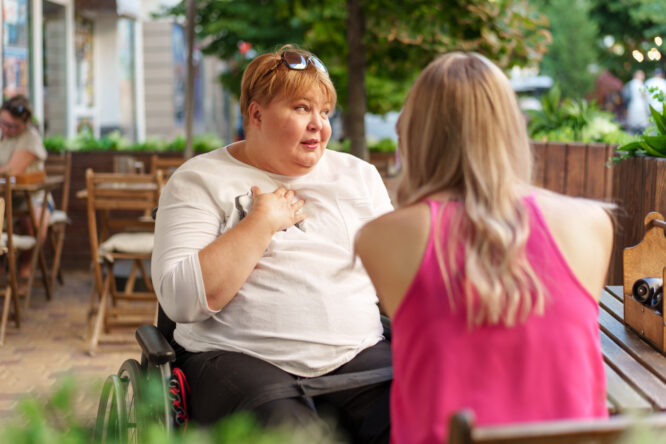
Trying to erase someone’s disability to make them feel “included” actually does the opposite. It tells them that part of who they are is too awkward or uncomfortable for you to acknowledge. Disability isn’t a flaw to look past. It’s part of someone’s reality, and pretending not to see it doesn’t create respect—it just creates distance.
3. “What’s wrong with you?”

This question might come from curiosity, but it lands as deeply disrespectful. No one owes you an explanation of their body, mind, or medical history, especially not in casual conversation. Asking what’s “wrong” reinforces the idea that disability is a problem to be fixed rather than a difference to be understood. There are better ways to connect that don’t start with judgement.
4. “At least it’s not worse.”
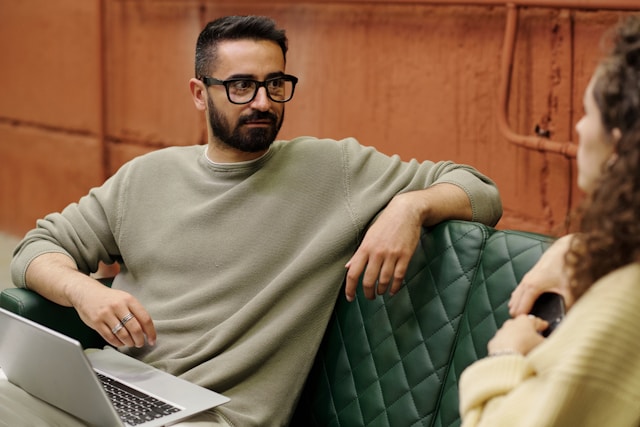
Comparing someone’s experience to something more extreme doesn’t make them feel better—it usually just makes them feel dismissed. It’s a subtle way of telling them they’re not allowed to feel what they feel. Saying things like this shut down vulnerability instead of holding space for it. Sometimes what someone really needs is for their experience to be taken seriously, without being ranked.
5. “You’re so brave.”
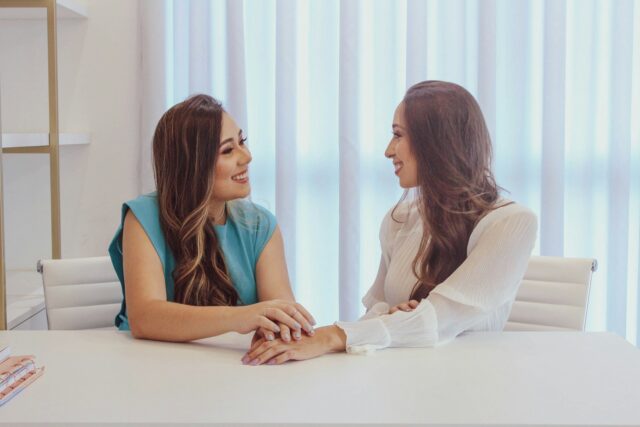 Source: Unsplash
Source: Unsplash Living with a disability isn’t automatically an act of bravery. It’s just life—full of routines, relationships, work, joy, and exhaustion, like anyone else’s. Calling someone “brave” for doing ordinary things reduces their identity to a struggle story. There’s a difference between recognising real courage and turning someone’s life into a feel-good moment. It’s worth knowing the difference before you speak.
6. “I know exactly how you feel.”

Unless you’ve lived it, you don’t. Even if you’ve faced challenges, chronic illness, or injury, experiences of disability vary widely. Trying to connect by claiming sameness can unintentionally erase what makes someone’s situation unique. It’s okay not to fully understand. Listening with humility goes much further than offering rushed relatability that misses the mark.
7. “But you look totally fine.”
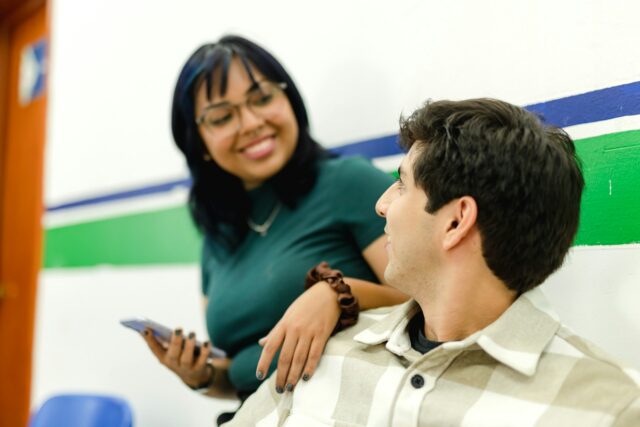 Source: Unsplash
Source: Unsplash This one comes up often for people with invisible disabilities. It’s meant to be reassuring, but it implies that disability only counts when it’s visible, and that struggling while appearing “normal” somehow isn’t valid. Disability doesn’t have a single look. Assuming health or ability based on appearance erases real experiences and keeps people in a cycle of having to constantly prove what they’re going through.
8. “Everything happens for a reason.”
 Source: Unsplash
Source: Unsplash This can feel dismissive, even if it’s meant to offer comfort. It tries to make peace with something hard by wrapping it in a neat explanation, but sometimes, there isn’t one. People with disabilities don’t need their lives spiritualised or repackaged into life lessons for other people. They need space to exist as they are, without being turned into someone else’s reminder to be grateful.
9. “You’re lucky you don’t have to work.”
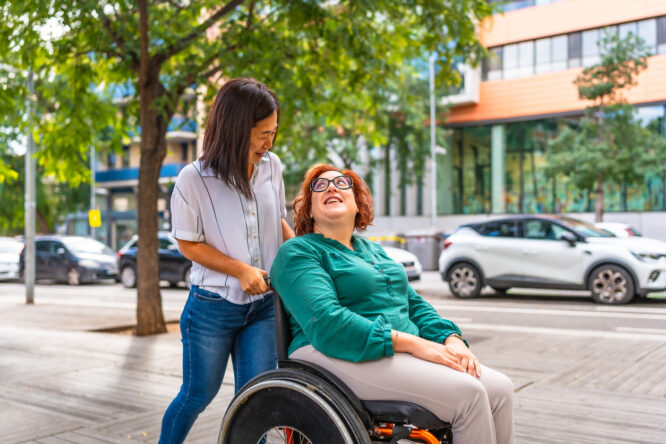
This comment is not only inaccurate, it’s loaded with assumptions. Many disabled people work in various ways, or want to work, but face discrimination and barriers that make it hard to access meaningful employment. Reducing someone’s experience to a perceived “perk” of disability shows a serious lack of understanding. The reality is often more complex, and the challenges go far beyond what’s visible from the outside.
10. “At least you get good parking.”

This one is meant to be light-hearted, but it trivialises the reality of living with a disability. A parking space doesn’t cancel out the daily frustration, pain, or exclusion that many disabled people deal with. Pointing out so-called “benefits” of disability minimizes the bigger picture. It’s not just tone-deaf—it reinforces harmful stereotypes about fairness and advantage.
11. “Have you tried…?”

People with disabilities are constantly offered unsolicited advice, from fad diets to miracle cures. Most of the time, the person suggesting it has no real knowledge of the condition or the science behind it. Even if it comes from care, it can feel condescending. Living with a disability often means becoming your own expert, and having to politely decline endless advice from people who’ve never lived a day in your body.
12. “I could never handle what you go through.”
 Source: Unsplash
Source: Unsplash This might sound like empathy, but it puts distance between you and the person you’re talking to. It turns their life into something terrifying or unthinkable, which can feel isolating instead of supportive. People with disabilities don’t want to be pitied or put on pedestals. They want connection, not admiration wrapped in horror.
13. “God only gives the hardest battles to his strongest warriors.”

This can feel deeply alienating, especially to people who didn’t “choose” a hard life or don’t connect with that belief system. It can also imply that their suffering has to be justified through strength or spirituality. You don’t need to assign meaning to someone’s experience to show them compassion. Respect, presence, and practical support will always land more genuinely than spiritual platitudes.
14. “You don’t act disabled.”
 Source: Unsplash
Source: Unsplash People often mean this as a compliment, but it’s not. It reinforces narrow, often inaccurate ideas about what disability looks or sounds like, and creates pressure to perform “ability” just to make people comfortable. No one should have to prove their disability to be taken seriously. The reality is more diverse, and that’s okay. There’s no one way to “act” disabled.
15. “I’d rather die than live like that.”
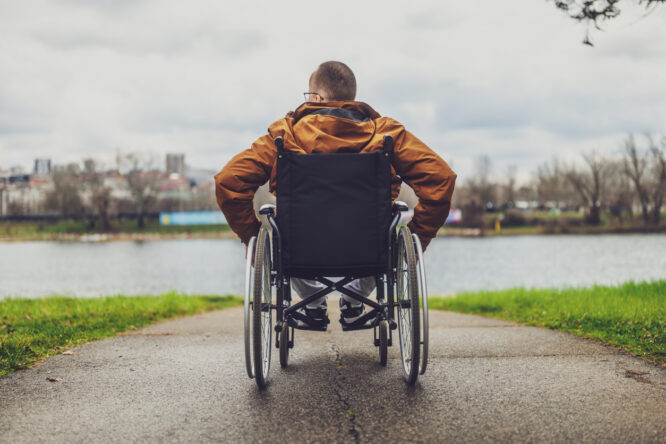
This one is jarring—and yes, people say it more often than you’d expect. It reflects deep-rooted ableism and fear, suggesting that life with a disability is a fate worse than death. For someone who actually lives that life, hearing this is hurtful and invalidating. Disabled lives are full, meaningful, and worthy, not tragedies to be pitied or avoided.
16. “You’re lucky you’ve got people helping you.”

What sounds like gratitude from the outside often hides a lack of understanding. Relying on support—whether it’s family, carers, or community—can come with emotional weight, lost privacy, and complicated dynamics. It’s not about luck; it’s about survival in a world that’s not built with accessibility in mind. Recognising that reality is the first step toward real allyship, not empty commentary.




